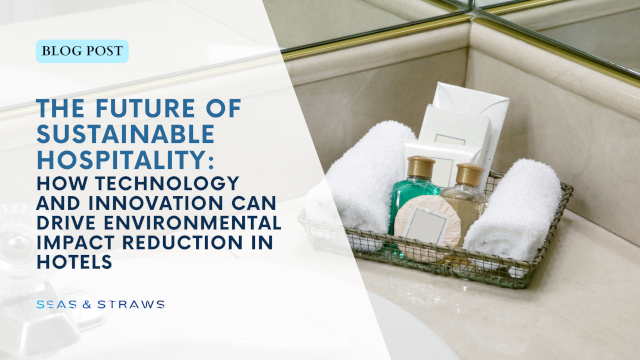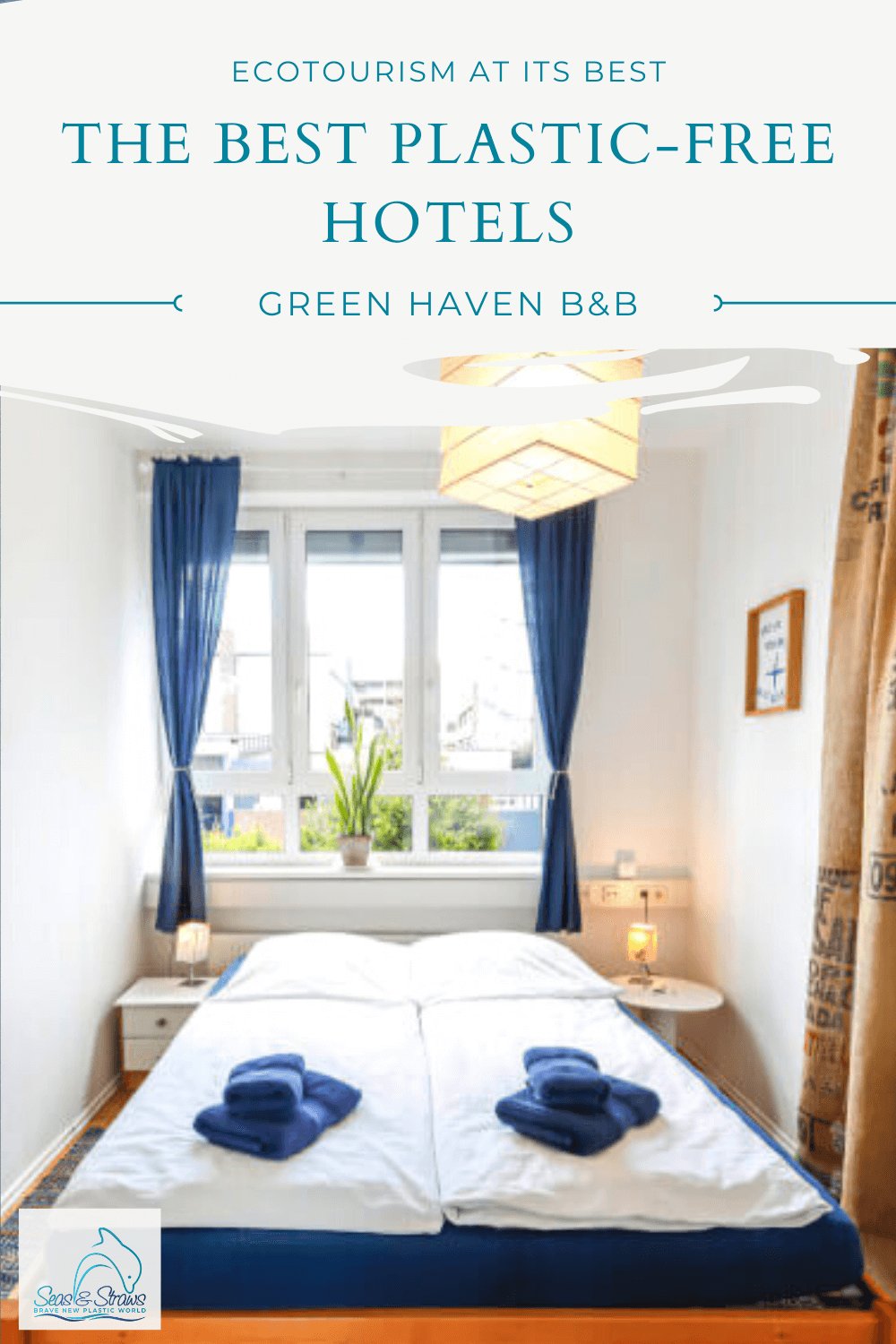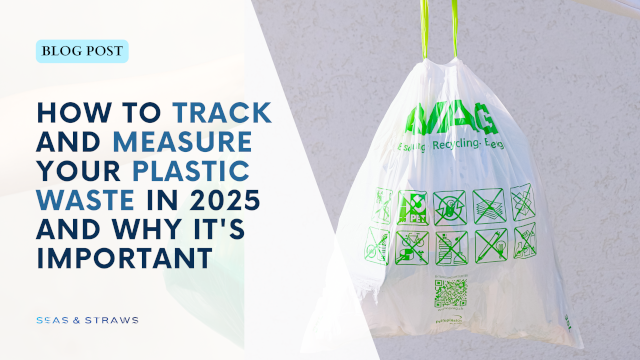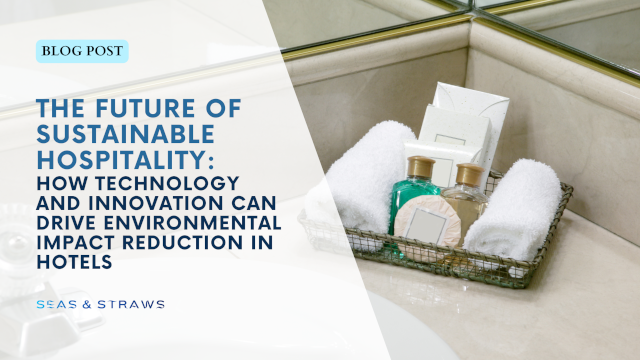- Home
- Hotels & Plastics
- Hotels And Plastics: Going Plastic-Free
- Sustainable Hospitality
The Future of Sustainable Hospitality:
How Technology and Innovation Can Drive Environmental Impact Reduction in Hotels
Written by Nicolina S. Sanders

Hotels play a big role in global carbon dioxide emissions, accounting for about 3%, and they also produce a staggering 290,000 tons of waste every year. With the spotlight on this industry intensifying, hotels are feeling the heat and are under constant pressure to cut down their carbon footprint. To tackle their environmental impact head-on, many hotels are being encouraged to say yes to more sustainable practices. The good news is that technology and innovation are stepping up, offering smart solutions to help reduce the carbon footprint in the hotel industry. From making energy use more efficient to conserving water, tapping into the latest advancements and innovations in tech can truly drive the industry towards more sustainable operations, and significantly lower its negative impact on the environment while also appealing to eco-conscious travelers.
Promoting Energy-Efficiency
According to estimates by Staze, around 70% of the carbon footprint produced by a hotel stay comes from energy use. Of this figure, 21% is caused by lights, laundry 20%, and heating and water 12% and 10%, respectively. Food and drinks also account for a large chunk of the carbon footprint at 25%. Given that energy is a significant generator of carbon emissions, it makes sense to implement smart building technology to decrease energy consumption and look for low-carbon renewable sources. Smart building tech can optimize energy use by controlling lighting, heating, and cooling systems based on room occupancy and external conditions. Hotels can also integrate solar panels, wind turbines, or geothermal energy to ease reliance on traditional energy sources. For example, a hotel that is near to the North Sea can benefit from installing wind turbines or buy energy from nearby wind energy producing stations. In addition, regularly updating to energy-efficient appliances including LED lighting can significantly reduce power consumption.
When you’re planning your next vacation, you can definitely pitch in to promote better energy consumption by choosing hotels that prioritize eco-friendly practices. When you simply decide on accommodations that focus on sustainability, you’re not just making your stay more enjoyable; you're also playing a part in lowering your carbon footprint and encouraging the hotel industry to adopt greener measures. Also, taking the time to plan your holiday with these factors in mind can really make a difference - it comes down to being intentional when you plan for a trip, so that not only do you have a fantastic getaway, but you also contribute to a healthier planet, so that each trip you take is both memorable and responsible. In addition, you indirectly support local businesses and initiatives as often green hotels collaborate with communities to promote economic and environmental projects. Knowing that you’re staying in hotels that care about the planet also provides a sense of satisfaction and peace of mind. According to a study by Soni, Hussain, and Kareem, green initiatives spearheaded by hotels have a positive impact on customer satisfaction. It also encourages customer loyalty.
Implementing Water Conservation Measures
The United Nations (UN) Environment Programme says that at a minimum, 50% of the world’s population experiences water shortage at least once a month. Considering that only 3% of the word’s water supply is freshwater, it is imperative to conserve this precious resource. Already, hotels and motels use an average of 81,527 liters a day in the Tampa Bay Area. Imagine how much more other hotels are using creating intense pressure on water supplies. The good news is technology can help with water conservation and management. For instance, hotels should invest in smart water meters that offers real-time data on water usage enabling management to track consumption and check for inefficiencies. Smart meters can detect leaks early on preventing water waste.
Hotels may also upgrade to water-saving appliances and equipment. Efficient fixtures such as low-flow toilets, showerheads, and faucets moderate water consumption significantly while newer models of washing machines and dishwashers can optimize water usage.To keep lawns and gardens constantly green, smart irrigation controllers can provide useful weather data and soil moisture sensors to calibrate and adjust watering schedules preventing excessive use of water. Drip irrigation is another alternative that delivers water directly to plant roots minimizing water loss through evaporation especially when the weather is too warm. Futhermore, advanced wastewater treatment technologies can be used to purify and reuse treated water for non-potable purposes such as irrigation, landscaping, toilet flushing, or cleaning. Hotels can also harvest or collect rainwater in containers for landscaping, cleaning, and other uses.
Enhance Waste Reduction and Recycling
In keeping with a sustainable approach to hotel operations, management can implement an efficient waste management systems to lessen waste that goes to the landfill and improve recycling rates. Waste generation minimization starts at the source by reducing packaging through eliminating unnecessary purchases and advocating for reusable products. To illustrate, shampoo and conditioner dispensers leave a lower carbon footprint than individual bottles while soap bars are better alternatives to soap in plastic bottles. Reusable cups and bottles that guests can use during their stay also decrease waste.
Many hotels already practice reusing linens and towels, but if everyone joins in the environmental action, the impact on carbon emissions is greater. According to stats by Hotelintel, 50 liters of water is saved every time a guest refrains from changing their towel. The Caribbean Cares Towel and Linen Initiative estimates that a medium-sized hotel can save on average 22,712 liters of water and 151 liters of detergent. Therefore, investing in high quality linen that withstands frequent washing and drying also helps the environment. Furthermore, technology can help in recycling and composting efforts. It is also a good idea to conduct regular waste audits to see where opportunities for reduction lie.
When hotels say yes to the above strategies, they can trim down their environmental impact and promote a sustainable future. Embracing technological advancements not only helps in decreasing carbon footprint, but also enhances guest satisfaction.














